Breadcrumb navigation
Introducing Guildhall De-Centre for Socially Engaged Practice and Research
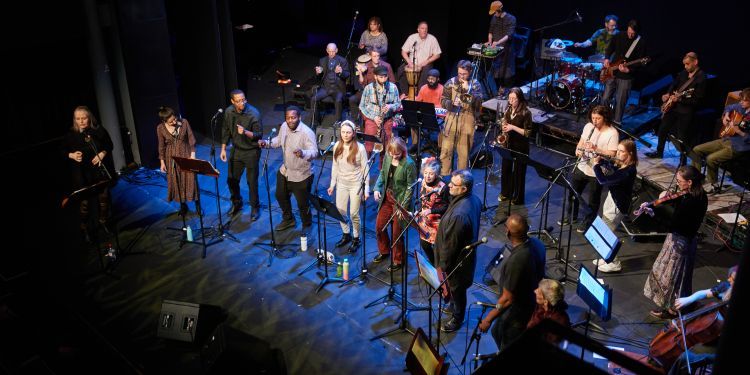
Guildhall School has launched Guildhall De-Centre for Socially Engaged Practice and Research, building on the work of the Guildhall’s former Institute for Social Impact Research in the Performing Arts
Guildhall School has launched Guildhall De-Centre for Socially Engaged Practice and Research, building on the work of the Guildhall’s former Institute for Social Impact Research in the Performing Arts and other past initiatives that have explored socially engaged, equitable, sustainable and transdisciplinary practices across the School and beyond.
To learn more about the De-Centre, we spoke to Dr Sophie Hope, Lecturer in Socially Engaged Practice at Guildhall School.

How did Guildhall De-Centre come about?
The De-Centre has deep roots in the socially engaged activities of Guildhall School, from the launch of the first conservatoire-based Music Therapy course in the 1970s; through the pioneering work of the Performance and Communication Skills department in the 1980s and ’90s; to Guildhall Connect and Barbican Guildhall Creative Learning, underpinned by the BA (Hons) Performance and Creative Enterprise and MMus Leadership degree and modular programmes in the 2000s and 2010s; right up to the establishment of the Institute for Social Impact Research in the Performing Arts in the 2020s.
The formation of DISRUPT in 2021, which looked at community led governance structures in cultural organisations during and after the pandemic, has also been key to the evolution of the De-Centre. Equally, the De-Centre has worked closely on pioneering extra-curricular programmes at Guildhall School designed to support students to collaborate across, between and beyond disciplines, and to push at the boundaries of their artistic practice.
I came on board in February 2024 to take up the new post of Lecturer in Socially Engaged Practice, supporting the next steps for the Institute for Social Impact Research in the Performing Arts and its evolution into Guildhall De-Centre for Socially Engaged Practice and Research. Working with Vice-Principal & Director of Innovation and Engagement, Professor Sean Gregory, and a steering group of staff from across the School, we have engaged with staff, students, stakeholders and partners to develop the approach we want to take with the De-Centre, our theory of change, and to create a programme of activities for the year ahead (which you can find out more about at Guildhall De-Centre).
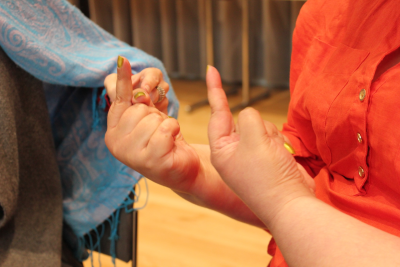
What do you mean by a socially engaged conservatoire?
In a way, we’ve set up the De-Centre to address this very question. Getting to know about some of the history of Guildhall School, it is clear there have always been staff and students who have been concerned with the relationship art and artists have with society. The role musicians, performers, makers and teachers play in supporting, addressing and connecting to social change and justice, for example, has been a key focus for many at the School, informing partnership-working, programmes of study and career trajectories over the years.
The question of what socially engaged practice means to artists who already understand their work as enmeshed in society isn’t new, but perhaps this is still an urgent question for conservatoires. Historically, conservatoires have perhaps been focused on training ‘elite’ artists in specific artforms, preparing them for specific career paths. There has not necessarily been the time and space in the curriculum for exploring how one’s ‘craft’ relates to, and is dependent on, the practices and infrastructures of everyday life, and the social, political and environmental contexts we are all a part of. Indeed, art schools and conservatoires have often been built on enlightenment principles which set art and artists apart from (even above) the trials and tribulations of ‘real life’. I think a socially engaged conservatoire sits in this zone, as a place that offers the time and space to practise, experiment and create, but has porous boundaries that makes use of its relationships, responsibilities and dependencies to the socio-political-environment challenges of the present.
I think this sentiment is reflected in School’s current Strategic Plan which identifies the primary purpose of Guildhall School to “Be the home of exceptional training, research and partnership in the performing arts; helping people to live well, in a world worth living in”. This is emphasised in one of the eight strategic aims to have “A focus on sustainability, civic responsibility and creative leadership”. The De-Centre is part of this strategic direction where civic and community engagement is as significant as excellent training and leading-edge research. Indeed, you can see how research, training, civic responsibility and community engagement are inter-dependent and deeply entwined through the Lines of Enquiry.
A socially engaged conservatoire is as much about developing equitable, caring infrastructures internally as it is about developing and participating in socially engaged practices beyond the institution. A socially engaged, de-centred conservatoire acknowledges, for example, that many arts practices are multi-authored, co-owned and cross-disciplinary. Decision-making processes are often collective and collaborative rather than hierarchical. How this is manifested through the DNA of the institution is as important as the projects staff and students are working on with organisations and contexts beyond the School. So, an important element of the De-Centre is a focus on the School’s ‘internal workings’. This entails curriculum development, a mobile common room for staff and students to meet, rest and reflect, as well as workshops engaging with the School’s strategic priorities.
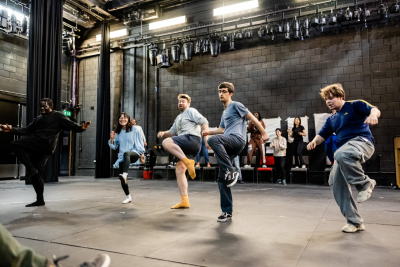
Could you tell us about some of the research projects being explored?
A key aim of the De-Centre is for staff to feel more confident and supported to develop specific socially engaged research and practice. As a starting point we have identified 15 socially engaged ‘lines of enquiry’ currently taking pace across the School to build a community of practice. As peers, we want to learn from each other and support each other’s work as it develops. We hope that by sharing and showcasing this work over the year, others will also find connections and the community can grow.
I have started by grouping these lines of enquiry into three areas:
The Micro cluster of projects includes relational practices, collaborations and encounters that are focused on specific projects, methods and interactions. For example, musicians and coaches Detta Danford and Natasha Zielazinski’s Music Motherhood and Me project explores the intersection of coaching and arts facilitation, how these interact and the impact this has on wellbeing and creative health in a series of creative sessions at The Magpie Project, a charity that supports mums and under-fives in temporary accommodation in Newham. Another project is artist and Postdoctoral Researcher Leslie Deere’s The Embodied Instrument: Immersive Experience for Creative Expression and Restorative Practice which looks at immersive technologies for live performance and the theatre space, as well as the creative possibilities of extended-reality technologies for self-expression and exploration within mind body practices.
The Meso cluster focuses on socially-engaged, de-centring practices in conservatoires. These projects explore the past, present and future roles and responsibilities of socially engaged conservatories. For example, producer and teacher Gilly Roche’s Re-imagining The Cross School Project asks “how can we reimagine the Cross School Project for the progressive, plural, post- disciplinary conservatoire?”. It positions the project as a marquee event within the School’s timetable – an opportunity to instil an ethos of artistic curiosity, collectivity and mutual support within the community of students. Connected to this, Guildhall School Principal Professor Jonathan Vaughan’s Artistic Citizenship and Performance Excellence in Music relates to his current doctoral research into the integration and practical training of Artistic Citizenship within conservatoire curricula.
The Macro cluster of enquiries explores the broader theoretical and structural questions about the issues and implications of de-centring, socially engaged practices through creating inclusive, caring, equitable and diverse structures. For example, sound artist, researcher and teacher Nell Catchpole’s line of enquiry Environmental Justice. Is environmental sound art activist (enough)? explores participatory ecological sound art’s potential for affect/effect through collective “intensities of listening” and sonic actions. Professor of Dramatic Writing Nazli Tabatabai- Khatambakhsh’s line of enquiry How do you tune into collaboration? is about developing an Equitable Collaboration Framework and Facilitation Methods Toolkit. Through transdisciplinary research practice Nazli is engaging with multiple ways to connect, for example how we tune into each other through the sharing of aesthetics and narratives, using dramaturgy, observation and writing.
We’ll be exploring the connections between these enquiries over the year, developing mechanisms for peer support and presentation. More information can be found at Guildhall De-Centre about these and all the other enquires.
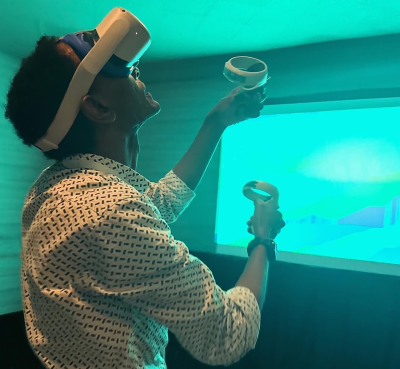
What do you hope will happen through the creation of the De-Centre?
There are a few things that are driving our theory of change through the development of the De-Centre. We hope to develop a community of practice amongst researchers and artists working and studying at Guildhall who are doing socially engaged work. We hope to make this work more visible, valued and connected. This is about making some time and space for staff, students and the people they work with to share and reflect on their ways of working, the issues they are facing, and the boarder theoretical, political and social contexts they are situated in. Secondly, we want to make more visible the legacy of this work at the School by creating a podcast series looking at the history of socially engaged practice at the School. Another important aspect is exploring the ways socially engaged practice is taught by developing clear study trajectories as part of the School’s every expanding lifelong learning offer. By building this network we hope over time this can contribute to solidifying Guildhall School’s position as an active site for socially engaged practice and research across teaching, research and its internal structures.
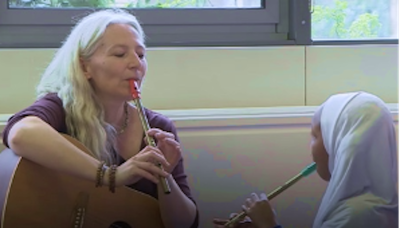
How can people learn more about your work?
Visit Guildhall De-Centre
Come along to our public events (for everyone) or our internal programme of events (for Guildhall School staff and students).
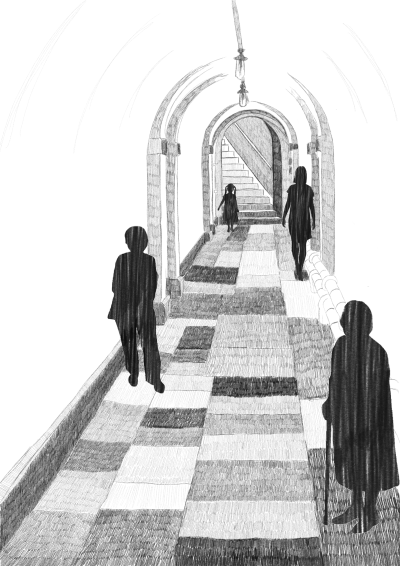
Images above from top to bottom:
The Messengers, Milton Court Theatre, Guildhall School of Music & Drama, 2 March 2023. Photo by Paul Cochrane.
Dr Sophie Hope, Lecturer in Socially Engaged Practice at Guildhall School.
Embodied Voices AHRC Project (Workshop), "Moral and political value of the embodied voice" Guildhall School, September 2024. Photo by Leslie Deere.
Students and company members from The PappyShow, facilitators of the undisciplined residency, 2022. Photo by Matthew Ferguson.
Participant interacting with Array Infinitive at the 30th Annual Science of Consciousness Conference, University of Arizona, April 2024. Photo by Leslie Deere.
Still from Selective mutism: Why this girl didn't speak at school until she was 7. BBC Stories, 2017.
EverSong. Illustration by Jessica Clements.